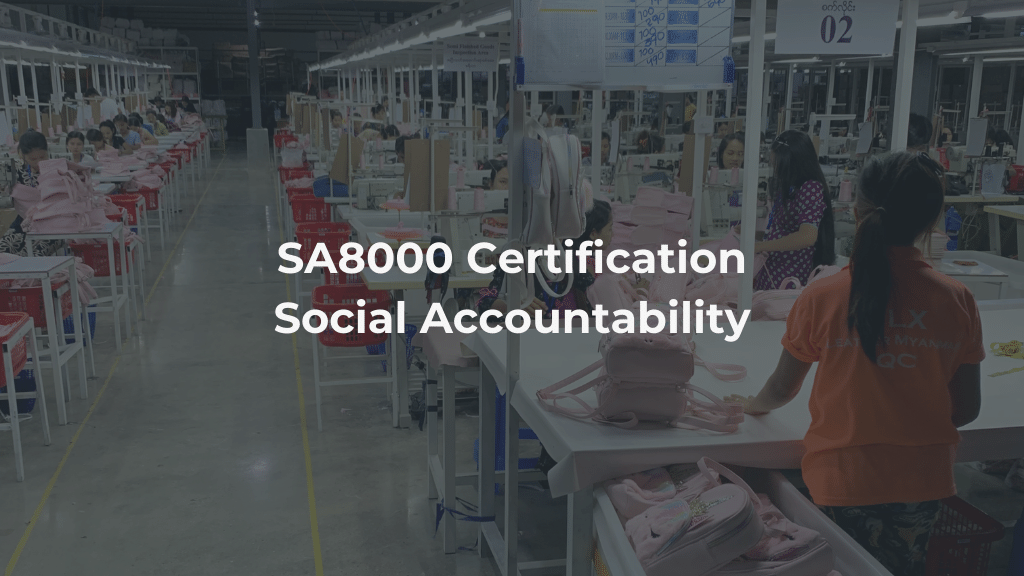As the world continues to prioritize ethical practices and social responsibility, bag manufacturers must take proactive steps toward sustainability and fair labor standards to succeed. Both consumers and retailers are demanding products that not only have aesthetic appeal but also demonstrate a solid commitment to ethical principles. One reliable way for bag manufacturers to demonstrate their dedication to high standards is by obtaining certifications. In this article, we will delve into the significance of the SA8000 certification within the bag manufacturing industry and explore the social benefits it brings to your operation.
Overview of the SA8000 Certification
The SA8000 is the world’s leading social certification program. It serves as a globally recognized standard for social accountability and ethics in the workplace, based on international fair labor standards such as the Universal Declaration of Human Rights and ILO (International Labor Organization) conventions.
Created by SAI (Social Accountability International) in 1997, the SA8000 certification demonstrates dedication to responsible business practices and employee well-being. It helps businesses in the fashion industry and beyond establish systems for ethical treatment, fair wage structures, safe working conditions, and compliance to the highest human rights standards across the supply chain.
SA8000 was the first official social certification and continues to pave the way for ethical labor standards across multiple industries.
Standards and Requirements
The SA8000 certification promotes ethical work standards by emphasizing the fair treatment of workers and advocating for their rights. It sets a high bar for manufacturers to implement effective social practices throughout their supply chain, encouraging a respectful and dignified work culture across the board.
To achieve the SA8000, bag manufacturers must display adherence to the following standards:
- Child Labor Prohibition. Manufacturers must never employ child labor. All workers must be of legal working age, in accordance with local laws and international standards.
- Forced Labor Elimination. Employment must be voluntary, and workers must have the freedom to terminate their employment at their own will.
- Health & Safety. Manufacturers must provide a safe working environment that poses no risk to employee health. They must implement measures to prevent accidents, injuries, and other occupational hazards.
- Freedom of Association & Collective Bargaining. Workers must have the right to form and join trade unions or worker associations, enabling them to collectively bargain and communicate any work-related concerns or grievances.
- Discrimination Prevention. Manufacturers must treat workers fairly and without bias regardless of race, religion, gender, or sexual orientation. Their hiring policies must reflect their anti-discrimination pledge.
- Fair Working Hours & Compensation. The manufacturer must compensate all employees with fair living wages (according to national laws) and give contracts that comply with legal working hour laws.
- Disciplinary Practices. Manufacturers must not engage in cruel or unfair disciplinary practices.
- Management Systems. The organization must establish and maintain management systems that effectively implement and monitor social accountability policies.
- Social Performance Indicators. The organization should track and analyze social accountability programs to ensure their effectiveness using social performance indicators.
Benefits and Significance
The SA8000 certification allows bag manufacturers to reap numerous benefits within their operations. It drives positive change both within individual businesses and the industry as a whole, helping manufacturers improve their reputation while better-serving employees.
SA8000 certification builds credibility and trust among consumers and business stakeholders by demonstrating a commitment to fair labor practices and ethical responsibility. This in turn gives brands and manufacturers access to socially-conscious markets and retailers that prioritize ethical sourcing and production.
On an internal level, adhering to SA8000 standards creates an improved work improvement that promotes employee satisfaction, retention, and productivity. It gives manufacturers the opportunity to operate with a sense of pride, knowing that they are making a positive difference within the industry.
SA8000 Certification Process
The SA8000 certification process involves several key steps. To begin the process, manufacturers must complete a self-assessment that evaluates their current practices against SA8000 standards. This allows them to familiarize themselves with certification requirements, and better identify any areas that require improvement.
After completing the self-assessment, manufacturers must undergo a 2-step audit that is conducted by an accredited third-party official. The more basic Stage 1 Audit assesses the organization’s readiness for SA8000 implementation. Organizations that pass the initial audit can move on to the more comprehensive Stage 2 Audit, which can last up to 10 days depending on the size of the operation. This involves reviewing workplace practices, documentation, operational records, and employee interview responses to determine operational strengths and weaknesses.
Manufacturers must develop and implement a corrective action plan if any non-compliances are found during the second audit. Manufacturers can finally receive their certification once they successfully meet the standards.
Although SA8000 has a set foundation for their standards, they are advocates of continual improvement. All accredited organizations must undergo periodic surveillance audits to ensure continued observance and encourage social innovation.
Industry Relevance
The SA8000 certification is a game changer in a world where consumers and businesses are increasingly conscious of the ethical practices of bag manufacturers.
Obtaining the certification allows bag manufacturers to strengthen their reputation within the market, which leads to enhanced business partnerships and customer relations. Many retailers and brands require their suppliers to adhere to specific ethical standards, so having the SA8000 certification will immediately open up new doors for bag manufacturers.
The SA8000 certification is a powerful tool for bag manufacturers seeking to embody ethical and responsible practices. Manufacturers can elevate their brand reputation by prioritizing fair labor standards, safe working conditions, and human rights throughout their supply chain while taking better care of their employees. Embracing SA8000 standards in the bag manufacturing industry signifies a solid commitment to the well-being of workers and sets a precedent for ethical excellence.

Amazing article. Thanks for sharing this amazing content. SA 8000 certification is most important.